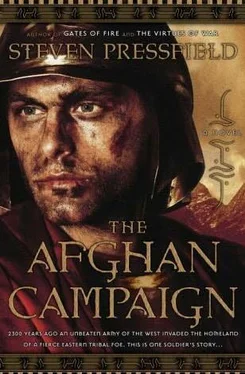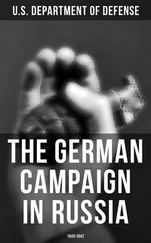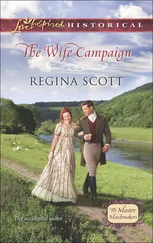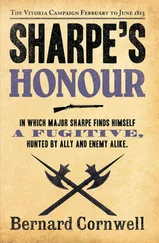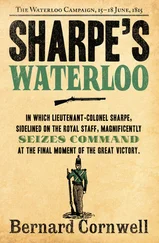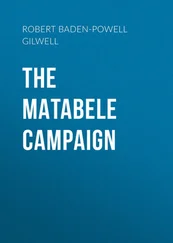Steven Pressfield - The Afgan Campaign
Здесь есть возможность читать онлайн «Steven Pressfield - The Afgan Campaign» весь текст электронной книги совершенно бесплатно (целиком полную версию без сокращений). В некоторых случаях можно слушать аудио, скачать через торрент в формате fb2 и присутствует краткое содержание. Жанр: Исторические приключения, на английском языке. Описание произведения, (предисловие) а так же отзывы посетителей доступны на портале библиотеки ЛибКат.
- Название:The Afgan Campaign
- Автор:
- Жанр:
- Год:неизвестен
- ISBN:нет данных
- Рейтинг книги:4 / 5. Голосов: 1
-
Избранное:Добавить в избранное
- Отзывы:
-
Ваша оценка:
- 80
- 1
- 2
- 3
- 4
- 5
The Afgan Campaign: краткое содержание, описание и аннотация
Предлагаем к чтению аннотацию, описание, краткое содержание или предисловие (зависит от того, что написал сам автор книги «The Afgan Campaign»). Если вы не нашли необходимую информацию о книге — напишите в комментариях, мы постараемся отыскать её.
The Afgan Campaign — читать онлайн бесплатно полную книгу (весь текст) целиком
Ниже представлен текст книги, разбитый по страницам. Система сохранения места последней прочитанной страницы, позволяет с удобством читать онлайн бесплатно книгу «The Afgan Campaign», без необходимости каждый раз заново искать на чём Вы остановились. Поставьте закладку, и сможете в любой момент перейти на страницу, на которой закончили чтение.
Интервал:
Закладка:
It is Lucas who hates this work the most. His eyes have gone dark and hollow. “Are we more civilized than the foe?” he demands one night as we young men sprawl exhausted beside some trail, trekking back from the evening’s labor. “By what definition of virtue do we call ourselves soldiers and the enemy savages?”
Boxer warns Lucas to keep it down. Officers might hear and think he takes the Afghans’ side.
“Fuck the Afghans,” Lucas says. “I don’t care an iron spit for these murderous cowards. I’m talking about us. You and me, Boxer-and Matthias and Rags and every other young scuff thrown into this hell. What’s happening to us? ”
The fact is clear, though no rookie other than Lucas owns the bowels to give it voice, that we have entered a crucible of the soul, of war’s horror, and that it will change us. It has changed us already. Where will it end? Who will we be then? Myself, I feel its weight nightlong inside my skull, as spectacles of slaughter re-present themselves with such ghastliness that I dare not even shut my eyes.
“Part of me is dying,” says Lucas. “Something evil grows in its place. I don’t know what it is, but I fear and hate it. I fear and hate myself.”
Lucas calls us all on our jockeying within formation. He has seen us edge away from the fore line, where the butchery takes place. He’s right. The gruesomeness of war has hit us hard. Many can’t sleep. Others have withdrawn into silence and self-isolation. “We’re all thinking the same thing,” Lucas says. “‘What have I gotten myself into? Can I endure it? Will it drive me mad?’ I see it on all our faces; we’re running schemes in our heads: ‘How can I get out? What act will it take to get me sent home?’”
“Not all of us,” says Boxer. Rags and Flea back him up.
“What about you, Matthias? How can you endure this?”
“My father and brothers,” I respond with truth, though I have not even thought about it before this moment. All three are warriors and heroes. I would sooner die than prove unworthy of them. Shame at my failure in the first village (and other acts of reluctance and irresolution since then) has made me, if anything, even harder on myself-to banish doubt, to be a soldier, to reject all such arguments as my friend voices now. “We can’t let ourselves think that way. This is war, Lucas!”
“Yes,” my friend answers. “But what kind of war?”
BOOK TWO
11
Alexander enters from the wing and mounts to the stage with a single athletic bound. A sigh expels from the company. There he is!
Twenty-six days’ trek has taken us to Phrada, southern Afghanistan. On our right, the column skirts the Dasht-i-Margo, the Desert of Death. To the left ascend the foothills of the Paropamisus (“that over which the eagle cannot fly”) and, beyond, the shoulders of the Hindu Kush. We can see the peaks a hundred miles off, already mantled with snow. Here, on the military highway, the grit underfoot is blistering. The night crawls with adders and scorpions.
It is autumn. The Wind of a Hundred and Twenty Days has begun. For four days in Phrada, our companies-those Macks who will be integrated into the regular corps-are assembled at dawn to be addressed by our king. For four days Alexander doesn’t show. We stand down each time, to hunker wretchedly in the furnace-blast of the gale.
What makes Afghanistan so miserable is there’s no shelter. The wind howls out of the mountains with not a twig to break its rush. Terrain is spectacular, but its beauty, if you can call it that, is stern and unforgiving. No trees intercept the rain, which descends, when it does, in volumes unimaginable. In the hot season you bind covers round every surface of metal exposed to the sun. To touch them unprotected blisters you to the bone. Now comes the wind.
To trek in such a gale is like marching in a tunnel. The universe contracts to the cylinder between your muffled eyes and the rucksack of the man in front of you. Where are we? As usual, nobody tells us. On a downgrade somewhere east of Lake Seistan, a colorful-looking fellow overhauls the column, driving a two-mule wagon. “Halloo, the highway!” he bawls, trying to use his downhill momentum to work through the jam. We are jostled onto the shoulder. The tourist is a chronicler, one of the cohort of freeloading correspondents who have attached themselves to Alexander’s party, pledging to record for posterity all exploits of the expedition. Soldiers love and hate these half-obol Homers, whom they perceive as spectating from safety upon that stage where they, the troops, bleed real blood. Still they are here with us, these ink-mice, eating the same dust and shaking the same serpents out of their boots. Besides, they know the news.
“Hey, wax-scratcher!” Tollo hails the fellow. “What’s the story!”
The chronicler brightens, hearing our sergeant’s brogue. “Are you Macks?” The column is all Achaeans and Lycians. “What are you doing back here?”
“You tell us, you’re the one in the know.”
“Where are you from?”
This is the question all correspondents ask soldiers. It makes suckers of us, as it must every other mob of witless scuffs. We shout out our hometowns, as if we believe our new crony will record them in his dispatches and make us famous.
The correspondent’s name is Costas. He has the dandy’s look of an actor or musician; the kind of good-looking, glib fellow who has never plowed a row in his life. Like many of his colleagues, he affects a soldierly aspect; he wears a military cloak and a desert cap with a floppy brim. “Why don’t you write a book about us? ” Rags calls to him. “We’re the real army.”
“I would,” the chronicler laughs. “But who’d read it?”
The column pushes south to Phrada. Finally, on the fifth dawn, our king’s standard appears. Royal pages and knights of the Life Guard shuttle us again into a stockade in the lee of a scarp, a site that had been a ring for horse auctions. The gale relents. Alexander enters.
It is as if the sun has been lowered in on a rope. All gloom is dispelled; the daylight, which had been flat and featureless, turns golden bright. I have not expected our lord to be so handsome. He wears a plain cavalry cloak with no insignia of rank or kingship. He is taller than I had expected. I think: This must have been what it was like to behold Perseus or Bellerophon, or Achilles himself. Citations erupt and will not cease despite the king’s extended arms and his calls for silence. He grins. He looks impossibly young. His athletic bearing augments the impression of boyishness, and his clean-shaven good looks enlarge the sense of youth and vigor.
“Gentlemen!” We read his lips, though no sound can be heard above the clamor. “My friends, please…”
When the uproar abates, Alexander welcomes us, informing us that we are no longer replacements. We are soldiers of the expeditionary force. We shall commence drawing combat pay from the date of our arrival at Artacoana, and all expenses of the out-march will be reimbursed. We will be assigned to regiments. I witness for the first time that faculty of the king’s, which has been so much remarked upon, that is, his knowledge of men’s names and faces. He scans the foremost ranks, greeting fellows by name and patronymic and remarking with an easy jest upon older brothers or fathers who have served with the corps from its inception and exhorting them, the newcomers, to live up to their elders’ fame. “Believe me, brothers, there is still plenty of glory to be won-and plenty of loot!”
The hall erupts again. Alexander speaks briefly of the current campaign and lays out his design for the operations to come. The fight, he says, will soon be over. All that remains is the pursuit of an enemy who is already on the run and the killing or capturing of commanders who are already beaten. We will be out of here by fall, he pledges, and on to India, whose riches and plunder will dwarf even the vast treasure of Persia. “That said,” Alexander adds, “no foe, however primitive, should be taken lightly, and we shall not commit that error here.”
Читать дальшеИнтервал:
Закладка:
Похожие книги на «The Afgan Campaign»
Представляем Вашему вниманию похожие книги на «The Afgan Campaign» списком для выбора. Мы отобрали схожую по названию и смыслу литературу в надежде предоставить читателям больше вариантов отыскать новые, интересные, ещё непрочитанные произведения.
Обсуждение, отзывы о книге «The Afgan Campaign» и просто собственные мнения читателей. Оставьте ваши комментарии, напишите, что Вы думаете о произведении, его смысле или главных героях. Укажите что конкретно понравилось, а что нет, и почему Вы так считаете.
